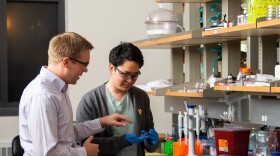-
Depression and other mood disorders may have side benefits – like creativity and empathy. Here’s whyLife with bipolar disorder or chronic depression can come with intense periods of sadness or despair. But these conditions might also come with some surprising advantages – including better social relationships and creative abilities. That’s according to new research from the University of Colorado. We dig into the possible “silver linings” of mood disorders.
-
Around the world, venomous snakebites kill tens of thousands of people each year. Antivenom can be an effective treatment, but it’s expensive and difficult to produce. A biologist at the University of Northern Colorado hopes to change that, with a new type of antivenom that’s cheaper to produce in large amounts. He discusses his research and recent breakthrough.
-
Bladder cancer affects thousands of people in the U.S. each year – and it’s difficult to treat. But scientists at CU Boulder may have found an innovative way to deliver chemotherapy to patients with bladder cancer. It’s inspired by the gripping power of gecko feet.
-
Kevin France, a professor of astrophysics at the University of Colorado Boulder, discusses the Habitable Worlds Observatory, a new space telescope that could help us find new worlds.
-
Bladder cancer affects thousands of people in the U.S. each year – and it’s difficult to treat. But scientists at CU Boulder may have found an innovative way to deliver chemotherapy to patients with bladder cancer. It’s inspired by the gripping power of gecko feet. We explore how the tiny lizards may have inspired a better form of cancer treatment.
-
Some Denver parents got texts during this winter's brutal flu season with videos sharing why people in their neighborhoods chose flu shots for their kids. It was an unusual study about trust and vaccines in a historically Black community but no one will know how it worked out: The Trump administration canceled the project before the data could be analyzed.
-
With the Trump administration making sweeping cuts to staff and research grants at science-related agencies, artificial intelligence could offer a tempting way to keep labs going, but scientists say there are limits to the technology’s uses.
-
Strong friendships are an important part of our well-being. If you want to cultivate new friendships – or learn to nurture the relationships you have – we get practical advice from CSU’s resident expert on friendships, today on In The NoCo.
-
A CU researcher made an interesting discovery recently. He found that injecting mice with a strain of helpful bacteria prevented weight gain – even in mice that were fed the equivalent of an all-fast food diet. He joined In The NoCo to talk about why this could be a promising solution for obesity in humans.
-
Studies show that women are more likely than men to have trouble sleeping. A new study from the University of Colorado examined why – and found some surprising answers. Are your sleepless nights caused by biology, or shaky scientific research? We dig into that question today on In The NoCo.

Play Live Radio
Next Up:
0:00
0:00
Available On Air Stations









